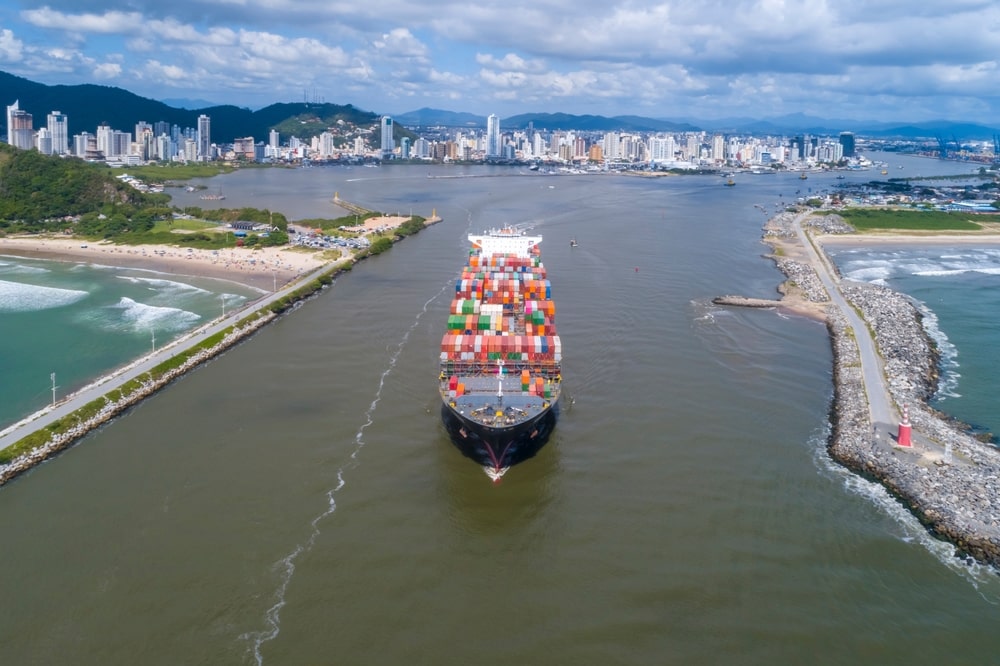
Docking of world's largest car-carrying ship brings into spotlight trade tensions between Brazil and China.
The BYD Shenzhen, the world's largest car-carrying ship - with the equivalent of 20 football fields of vehicles - completed its maiden journey in May 2025 to dock in Brazil's Itajai port, according to reports.
Itajai is one of Brazil’s most important ports, recording an annual trade flow of $40 billion last year according to analysis by ALPS Marine.
But, as Reuters notes, not everyone in Brazil cheered its arrival. As the news agency reports: “Brazilian auto-industry officials and labour leaders worry that the vast influx of cars from BYD and other Chinese automakers will set back domestic auto production and hurt jobs.
BYD has made Brazil its top target, according to Reuters’ analysis of shipping data and company statements. The late-May shipment was the fourth of the Chinese carmaker’s ships to dock in Brazil this year, totalling around 22,000 vehicles, according to Reuters calculations.
China-built vehicle imports are expected to grow nearly 40% this year, to about 200,000, according to Brazil’s main auto association. That would account for roughly 8% of total light-vehicle registrations.
"Countries around the world started closing their doors to the Chinese, but Brazil didn't," said Aroaldo da Silva, a Mercedes-Benz production worker and president of IndustriALL Brasil, a confederation of unions across six industrial sectors. "China made use of that."
The trade tension between Brazil and China is caused by the latter’s ambitious global expansion strategy. Russell analysed this relationship in the second issue of our Trade Threat Observatory reports.
Last year, Brazil imported $2 billion worth of cars & people carriers by ship from China according to analysis by ALPS Marine.
According to Reuters: “A growing surplus of new cars being pumped out of Chinese factories has led to an export boom over the past five years, helping China pass Japan in 2023 to become the world’s top vehicle exporter. Much of this excess is being shipped overseas, to markets like Europe, Southeast Asia and Latin America.”
The country’s population is 212 million and is the sixth-largest car market globally, based on new car registrations. Brazil not only stands out for its high demand for vehicles; it is also among the leading passenger vehicle manufacturers worldwide, reports Statista.
Abroad, as Reuters reports, governments have: “erected stiff trade barriers for Chinese cars, including a 45.3% duty in Europe and a tariff of more than 100% in the United States, along with a ban on Chinese software in cars.
BYD’s approach to exporting its vehicles depends on its ability to increase shipments without encountering pushback by local governments. However, Brazilian industrialists are concerned that BYD’s effort to start local auto manufacture are being delayed.
This is compounded by what happened in 2023 when Brazil’s officials welcomed BYD’s purchase of an ex-Ford factory in the state of Bahia, which they expected to generate jobs and intensify the country’s transition to a green economy. This was scuppered when an investigation into labor abuses on the manufacturing site delayed the timeline to December 2026. GWM is also a Chinese auto manufacturer which also pushed back its plans by 12 months to commence production at a former Mercedes-Benz site.
There are fears that an abundance of imports will reduce investment in local production. Those fears are amplified by concerns that even if the factory is based locally, it is often the case that components, development, and technology are all sourced from abroad.
As Reuters notes: “President Lula da Silva's left-wing Workers Party government is scrambling to protect jobs and the environment as it aims to both revive Brazil's industrial economy and restore its green credentials ahead of hosting the COP30 global climate summit this November.”
But Brazil’s green-car movement continues to rely on Chinese imports, accounting for more than four fifths of local electric-car sales, according to Brazil’s EV association, ABVE.
It all amounts to a heap of political and economic tensions that neatly sum up the challenges of navigating a path through the complexities of today’s connected green trade environment.